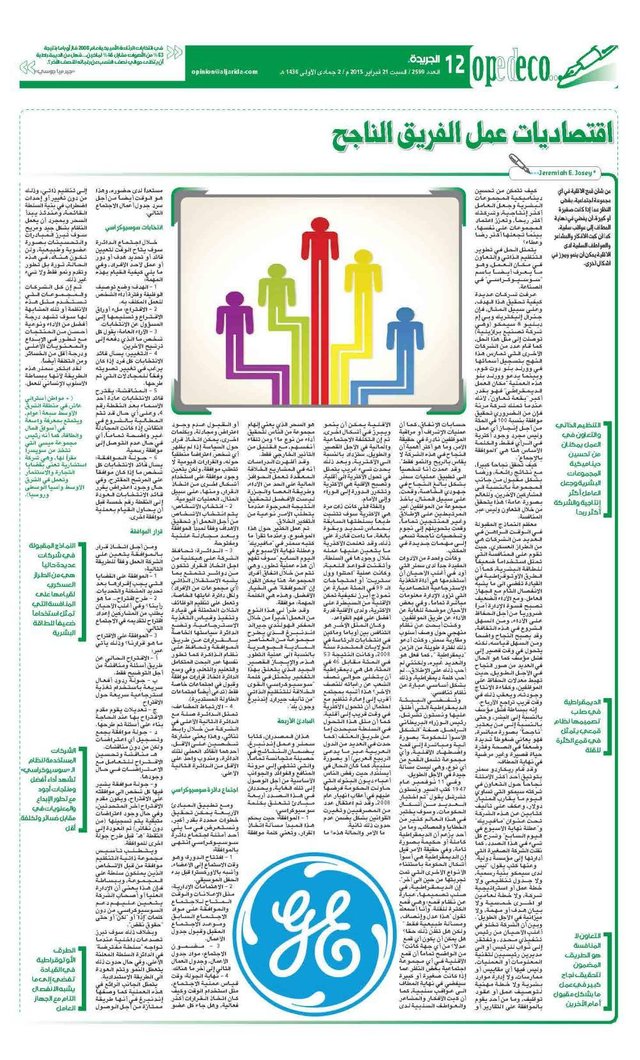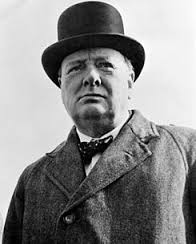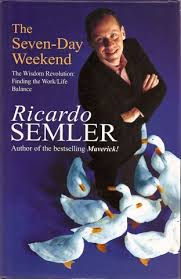The Economics of Good Team Work – The Easy Way to Improve Business Profits for the Long Term

I wrote this article for the Kuwaiti Al Jarida newspaper and took a full page to discuss the economics of good team work for a business.
It is published here:
Kuwait Al Jarida Article (Go to page 12)

The Economics of Good Team Work – The Easy Way to Improve Business Profits for the Long Term
How do you improve human group dynamics and allow people be more productive, your business to be more profitable, groups to be self reliant, whilst at the same time have it be more satisfying, more rewarding and straight out more enjoyable for the individuals involved?
The solution: Develop a self organising, collaborative workplace (also known as in the industry as "Sociocracy".

Many big companies have worked out how to do it, for example GE, BMW & Semco (a Brazilian manufacturing company.

Many more practising the process have registered themselves at WorldBlu.com. While Worldblu calls it "democratic workplace", it's really more likely to be collaborative one, since when you have a flexible organisation, it is more likely that 100% consent is necessary to achieve anything, and not merely majority rules, or minority suppression - what a democracy is. The key word here is “consent”.

How to achieve great success, with great results, rewards and satisfaction in a manner which is harmonious to the group, to other participants, and to the world in general? It is not through competition. It is through collaboration.
Much of the presently accepted models in many organisations are military style and competition based. Competition is a poor use of human potential. Collaboration is the way to go. The autocratic leadership methods necessary lead to almost total staff disconnection. Poor performance, and whip-like management mentality becomes necessary to maintain performance. Such a culture is easy to start, and success may be evident and easy to measure, but failure is not far away - staff retention rates fall, production efficiency drops, product quality disappears, and eventual profits follow soon after. It's simply a dismal failure at humanity, at being human even. Even for those directly measured to have "succeeded" they experience high stress, poor health and eventual a short, and ultimately an unsatisfying life.
One of the most successful examples of Collaboration has been documented by Ricardo Semler with his company Semco, today a billion dollar operation.
He wrote two books about it: "Maverick" and "7 Day Weekend" where he explains everything in succinct terms. He took his small family run company and grew it into an international corporation whilst he progressively ceased his day to day operational involvement.

Get the book Maverick here
"Semco has no official structure. It has no organisational chart. There's no business plan or company strategy, no two-year or five-year plan, no goal or mission statement, no long-term budget. The company often does not have a fixed CEO. There are no vice presidents or chief officers for information technology or operations. There are no standards or practices. There's no human resources department. There are no career plans, no job descriptions or employee contracts. No one approves reports or expense accounts. Supervision or monitoring of workers is rare indeed. Most important, success is not measured only in profit and growth." Ricardo Semler, Founder of Semco

I use Semler's processes to stunning success in my own endeavours. For example I've taken totally disconnected and non-performing employees, and turned them into stars, "fought" over within the office for new assignments. One of the very useful Semler tools I developed futher is the Upward Feedback Tool. This provided management with very directly, and some times very revealing feedback on their own performance from their staff and employees.
I've been searching for a methodical system to describe Semler's approach, and for a long time I called it "democratic" as he and many others have done. But I've never liked that, that word "democracy". It is essentially a competitive system
Dubbed "the worst form of government" by Winston Churchill, democratic environments automatically and immediately lead to the oppression of the minority and any group that contains oppression of any kind is never a good thing in the long term.
"Many forms of Government have been tried, and will be tried in this world of sin and woe. No one pretends that democracy is perfect or all-wise. Indeed, it has been said that democracy is the worst form of government except all those other forms that have been tried from time to time." Sir Winston Churchill, Hansard, November 11, 1947

Democracy, by it's very design, is an oppression regime: the oppression of a few by the many. "This is fair. It's only natural", I hear you say, but do you really think so? Is any oppression fair? Of anyone? It is quite plain to see that any minority oppression in a social group no matter how large or small, has an ultimately negative consequence. Suppressed negative thoughts, feelings, and emotions harboured by the minority can only grow and manifest in other forms. The costs - both social and financial, short term and long term - to control, pacify, down-right-openly-oppress increases for the majority.
Then something curious happens: the majority find themselves the minority, the minority becomes the majority and the cycle is repeated. Back and forth, back and forth. Those once-were-majority of course hang onto their once-granted-power with great enthusiasm and vigour, as long as they are able. The majority learnt what to do while in power. They learnt the rules of the game. The Occupy Wall Street or "99% protests" were examples that highlighted how a majority can be controlled by a minority. The minority has a much better understanding of the rules.
An another example was the 2008 US election with Obama and McCain running against each other: it was 53% versus 46%. Is that a "democracy" when almost half of the people have to yield their desires for the other half?
This is more like a society close to reorganisation as the majority may soon become the minority. Such a shifting of power will occur either violently (like has been seen in many Arabic countries with the so called "Arab Springs", or CIA funded regime change) or passively, as with not-even-newsworthy Iceland.
In Iceland the people rejected the debt burden of the banks their brethren in government attempted to impose upon them from the financial meltdown of 2008. They arrested a number of bankers and changed their laws so it cannot happen again!
In Vietnam they shoot them: Vietnam Bankers...
So, what is it? What is the magic that means a group of people will be inspired to performance, all by themselves, with little external influence, other than maybe "Go!".
Studies, including by Harvard, have shown that for complex, creative projects, monetary incentives actually inhibits performance! It's not carrot and stick that works best where creative thinking is required.
See the first youtube here
Much has been done on the subject and reading Semler's "Maverick" and "7 Day Weekend" you'll understand that it is an evolutionary process, and it occurs by consent of the individuals of the group.
"Consent" a better option.
This is the important word: consent.
Work that recent came to me by the Dutch thinker Gerard Endenburg offers very substantial physical elements to this evolutionary process. A good short summary of this thinking is in "Sociocracy: The Creative Forces of Self-Organization", by Gerard Endenburg and John A Buck.

These two resources: Semler's books and Edenburg's work combined results in a very harmonious outcome: the flexibility of the benefits, and the basic parameters on how to get there.
Endenburg defines four basic concepts for a self-organising group:
Four Principles of Sociocracy
- Consent: The principle of consent governs decision-making. Consent means no argued and paramount objection. In other words, a policy decision can only be made if nobody has a reasoned and paramount objection to it. Day-to-day decisions don't require consent, but there must be consent about the use of other forms of decision-making, for example, for day-to-day operations.
- Election of Persons: Election of persons for functions and/or tasks takes place in accordance with the principle of consent and after open argumentation.
- Circle: The organisation maintains a structure for decision making, consisting of semi-autonomous circles (i.e. groups of individuals). Each circle has it's own aim and organises the three functions of leading, doing, and measuring/feedback. A circle makes its own policy decisions by consent, maintains it's own memory system, and develops itself through integral research, teaching and learning. A circle makes consent decisions only in special circle meetings (also called round table meetings).
- Double-linking: A circle is connection to the next higher circle in the organisation with a double link. This means that at least two persons, one being the functional leader of the circle and at least one delegate from the circle, are full members of the next higher circle.
With these four principles in place, more specific actions can occur. Here's an example of a Sociocratic Circle Meeting, a meeting of consent:
Sociocratic Circle Meeting
- Opening round: a time to tune into the members. Like an orchestra just before a concert.
- Administrative concerns: such as announcements, time available for the meeting, consent to minutes of last meeting, date of next meeting, acceptance of the agenda.
- Content: First agenda item, second agenda item, etc
- Closing Round: a time to measure the meeting process. E.g. use of time, did the facilitator maintain equivalence, how could the decision-making have been more efficient, did everyone arrive prepared. Also this is a time to mention agenda items that should be on the agenda for the next meeting.
During the Circle Meeting there will be times to appoint a leader or a task or role or job to an individual. Here's how it's done:
Template for Sociocratic Elections
- Task: establish the job description and the period of time the person will perform the job.
- Ballots: Fill our ballots and hand to the election leader
- "Public Gossip": each person says why they made their nomination
- Changes: Election leader asks each person if they want to change their votes based on the arguments they heard.
- Discussion: Election leader usually proposes a name after step 4. However they may ask for discussion if the arguments are very unclear - i.e. informal consent has not been reached.
- Consent round: Election leader asks each person if he of she consents to the proposed person, asking the person proposed last. If there is an objection, the election leader takes everyone back to step five before trying another consent round.
For making decisions by consent, a sociocratic organisation will operate in the following manner:
Template for making policy decisions by consent
- Consent to the issue(s) to be decided. "What's the concern, problem or challenge?"
- Generate a proposal. "What's our opinion?" Often a person or persons may be asked to prepare a proposal and bring it to the next meeting.
- Consent to the proposal. "What is our decision?"
- Present proposal - questions and discussion is for clarification only
- Quick reactions round - quick feedback about the proposal (intended to illicit the "feeling response", and not the "thinking response")
- Amendments - proposer amends proposal, if needed, based on the questions, discussions and quick reactions
- Consent round - collect and record any objections on a flip chart. No discussion at this time
- Discussion - improve proposal to deal with the objections if any
- Consent round - Each person indicates their consent to the proposal, with the proposer speaking last. If there are remaining objections, they are recorded (no discussion), everyone goes back to "Discussion", before trying another consent round.
Implementing a self-organising group requires consent from the people who exert power over the group. Simply stated this means that senior management and/or organisation owners must support Sociocracy. Full stop. No "ifs", "buts" or "maybes" or even "veto rights". Otherwise internal fractures will be created when the a circle's "assumed power" confronts the more senior "declared power". If that happens, growth is stymied and a slide back to pseudo-autocratic or totalitarianism, or even democratic systems will follow.
The great thing about this Sociocratic process as described by Endenburg, is that it's an excellent way to get self-organisation into an existing organisation without changing or upsetting the existing power structure. The magic then begins to happen and once the system is running well, initiatives and improvements emerge organically and naturally. There is no revolution, only evolution.
All companies and groups that utilise such or similar systems experience better performance, better products, innovation, higher moral, lower turnover, lower loss, lower costs.
Semler advocates this because, after all, he created the 7 day weekend!

Get 7 Day Weekend here
It is simply the human way to operate.
What could be better?
About the author
Mr. Jeremiah Emanuel Josey is an Australian who has been living in the Middle East for 10 years. Expert in the finance and energy markets, he is the Chairman of Swiss based MECi Group, a business and investment consultancy that operates across the Middle East, Central Asia and Russia.
See Jeremiah Josey @ Linkedin and www.MECi-Group.com for more.
